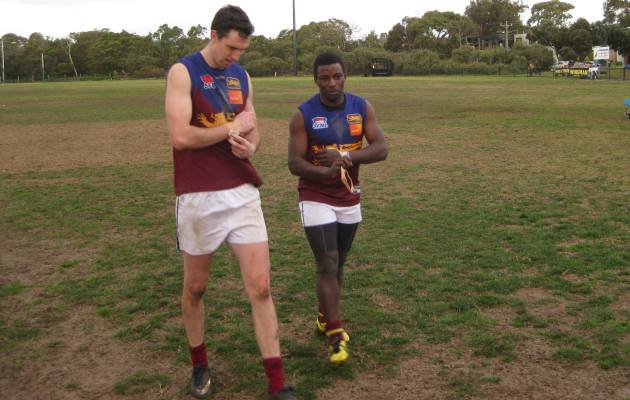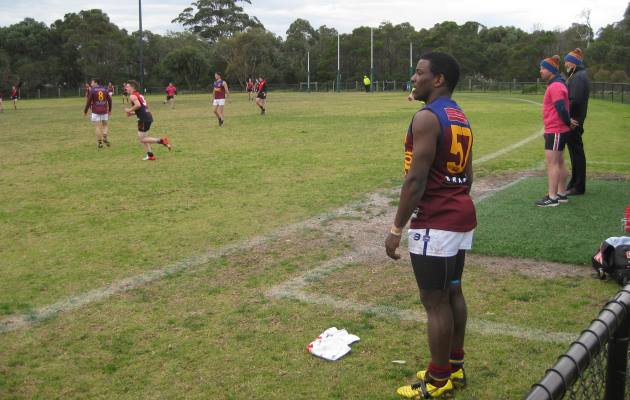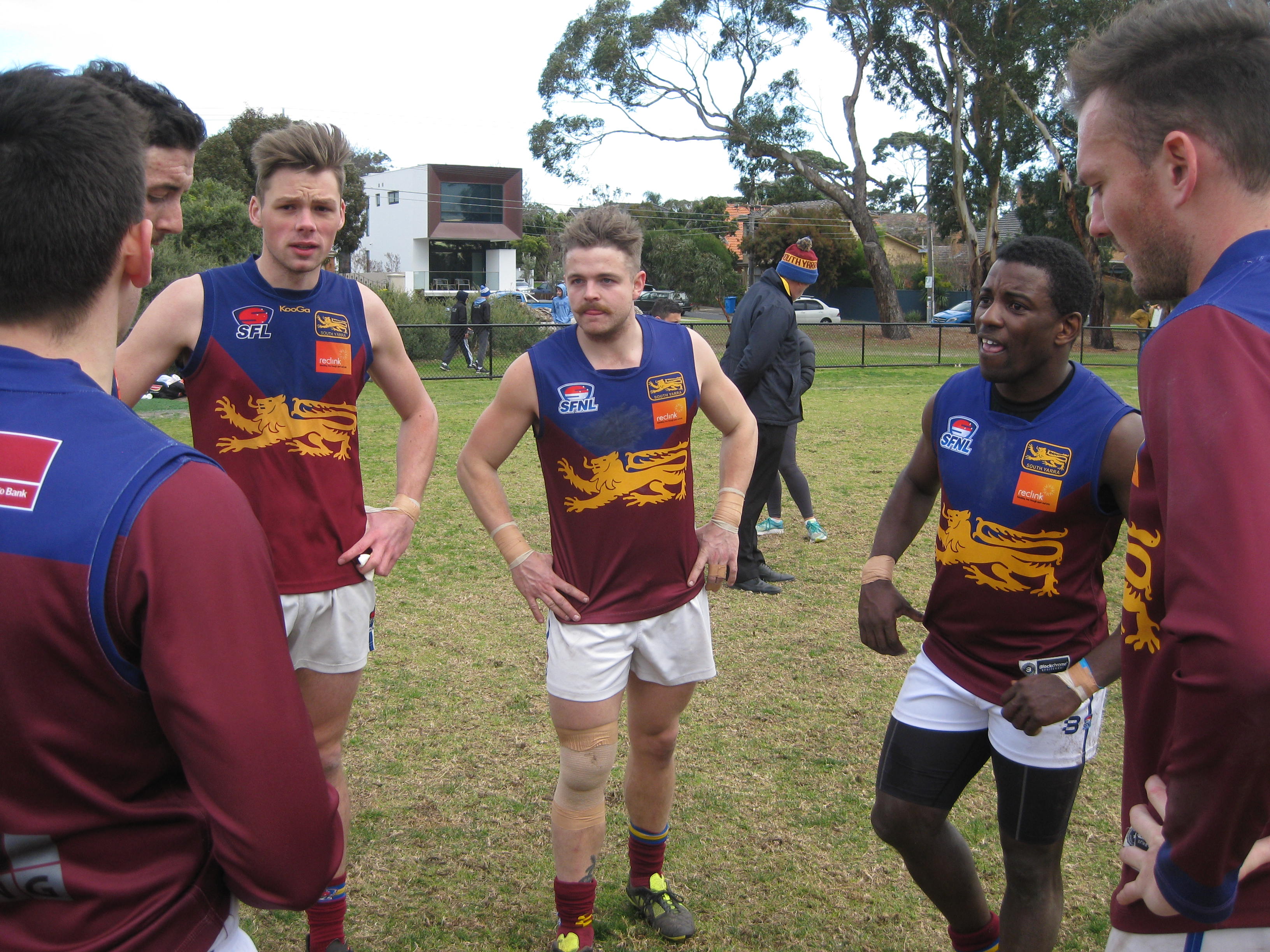By Andrew Paloczi
South Yarra recruit, Chris Mwaba has taken an indirect route to the club for which he finds himself lining up against Black Rock on an icy winter’s day.
Although the most recent part of that journey involved a transfer from the Sunbury Kangaroos, Mwaba’s life has exposed him to an array of places and cultures.
His name and appearance convey his African background, on which he elaborates.
“My heritage is Zambia, both my parents are from there. It’s next door to Zimbabwe and just above South Africa, landlocked country,” Mwaba says.
But Zambia isn’t where Mwaba’s story began.
He was born in Chelsea, London, but his father’s work in the mining industry ensured he wasn’t there for long.
The family headed to Lae in Papua New Guinea when Mwaba was about five years of age.
He reflects on the cultural differences between there and the Western world.
“It’s a different standard of living, very simple kind of people. You’d go to the markets to get your fruit and veg and your meats. Easy-going people, friendly, willing to help. It was just really good fun.”
The weather was generally hot and Mwaba spent most of his time outside.
His family enjoyed cookouts and music with other Zambian families.
“It’s always a good feed, if you get a chance to try it,” he says.
After more than eight years in PNG it was onto another warm part of the world, Queensland.
There, Mwaba’s sporting passion was for rugby league, but a further shift to Tasmania brought him to Aussie Rules footy.
With no real interest in rugby union, the only form of rugby available to him in Tassie, Mwaba was easily convinced by mates to try footy.
He recalls his humble beginnings in the Australian code when he “couldn’t kick, couldn’t handball properly”.
Mwaba played both school and club footy in Tasmania, including time at the unusually named Rosebery Toorak, which he reflects on.
“I played my first senior game down there. The town’s called Rosebery. There are about 2000 people in a mining town,” he says.
“So there wasn’t much else to do but play footy after school, so that’s what we did and I ran out at about 15, 16 years of age and played a couple of senior games down there and fell in love and haven’t stopped.”
Time in Tassie prepared Mwaba well for the icy wind at Black Rock last Saturday, although we took refuge in the clubrooms for our chat.
Despite his obvious enthusiasm for the game, Mwaba’s footy days may well have finished with a broken leg suffered playing for Sunbury.
His surgeon ended any thought of retirement, indicating that with plates and screws he could get him right for a few more years of footy.
Mwaba is asked whether or not he gets many questions about his African heritage.
“Yeah I do actually, probably because obviously I look like I come from Zambia, but I’ve got probably the strongest Australian accent going around. So everyone’s a little bit I guess surprised to hear that twang come out.”
That is a good starting point for discussions about his heritage.
Mwaba’s parents have taught him the history of Zambia and he can understand the language, Bemba, although unlike his sisters he can’t speak it.
He explains there are different dialects of Bemba depending on which part of Zambia you are from.
Although Mwaba has only visited Zambia once as a youngster, the country and its culture are important to him.
“Most of my school projects thinking back were around Zambia and I had a keen interest in learning about where I was from. Even though I was born in the UK, I still wanted to know where my roots came from. It’s something I’m proud of.”
Mwaba describes the significance of Multicultural Round.
“I think footy clubs are the best way to meet people and it’s a welcoming environment. I think it’s important and it’s a really great thing for the community to have people from different backgrounds.”
Although only newly arrived at South Yarra, Mwaba already feels welcome.
“It doesn’t matter who you are, where you’re from, what you look like,” he says.
Mwaba believes society has taken great strides in terms of embracing cultural diversity.
“I think we’ve come a long way. Everyone has the old equality discussion now and then. From a sporting perspective, I think we’ve come a really long way,” he says.
He highlights the contribution of indigenous Australians to the sport of Aussie Rules and the fact three Norm Smith medallists have come from the small population of the Tiwi Islands.
But Multicultural Round is an opportunity to reflect on the wide range of cultures that make up our sporting community and how they enrich the lives of all involved in clubs.
[caption id="attachment_15578" align="aligncenter" width="550"]

Chris Mwaba (right) walks off the ground following last week's match against Black Rock.[/caption]
[caption id="attachment_15582" align="aligncenter" width="550"]

Mwaba waits to come back on for the Yarras.[/caption]
[caption id="attachment_15581" align="aligncenter" width="550"]

Mwaba (second from right) in the South Yarra huddle.[/caption]
 Chris Mwaba (right) walks off the ground following last week's match against Black Rock.[/caption]
Chris Mwaba (right) walks off the ground following last week's match against Black Rock.[/caption] Mwaba waits to come back on for the Yarras.[/caption]
Mwaba waits to come back on for the Yarras.[/caption] Mwaba (second from right) in the South Yarra huddle.[/caption]
Mwaba (second from right) in the South Yarra huddle.[/caption]